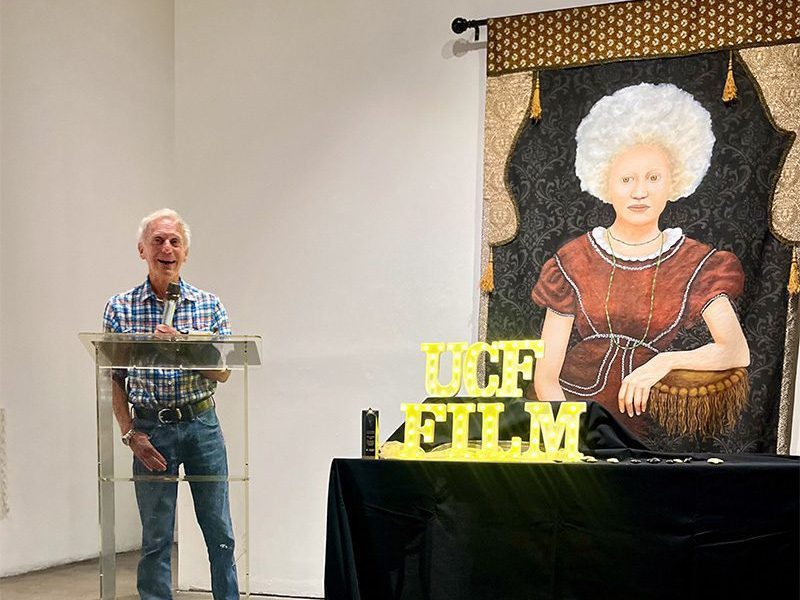Film Professor Receives Inaugural Cinematic Legacy Award
Associate Professor Barry Sandler reflects on career and milestone recognition
By Sultana Ali

As Film and Mass Media Associate Professor Barry Sandler commemorates his 20th year of teaching at UCF, he has something extra to celebrate—the inaugural UCF Cinematic Legacy Award from the College of Sciences. This first-of-its-kind award recognizes the achievements of a UCF faculty member to the film industry and passing along that knowledge to UCF students.
“Barry is a living legend,” said College of Sciences Dean Maggy Tomova, who presented him with the UCF Cinematic Legacy Award from the College. “He is an innovator, a changemaker, and he represents the magic of making movies to change the way that people view themselves and the world around them. He sees the potential and passion in UCF students and has empowered them in their own creative pursuits.”
Sandler expressed his gratitude for the award received in a ceremony in Los Angeles, California, surrounded by a number of UCF graduates he taught and now work in TV and film. “It was unexpected and incredibly moving to receive this award from Dean Maggy Tomova,” said Sandler. “For me, the message is that perhaps I got through to people over my film and teaching career, and it’s very gratifying.”
Sandler’s passion for screenwriting started early on in his childhood in Buffalo, New York, authoring short stories and watching movies whenever he could. “I knew from a young age I wanted to be a part of the movie business,” said Sandler.
There were few film programs in the U.S. when he was ready for college, so he followed his dreams to go to Hollywood and went to UCLA, where he received both B.A. and M.F.A. degrees in Film.
Sandler’s big break arrived in an unexpected way, a noteworthy story he often shares with his students to inspire them to believe in their creative ideas. While still in college, he wrote a story about the rise and fall of the roller derby queen, thinking it would make for a unique movie and envisioning actress Racquel Welch in the lead role. In an old Hollywood-era manner, he delivered the script directly to her house, where her assistant took the script. His grit and talent paid off, and the movie was bought and released as “Kansas City Bomber” in 1972, starring Welch. Sandler’s writing credit on the box office hit film laid the pathway for his career in film.
Over the next few years, he continued to write escapist and romantic genre films, including “Gable and Lombard” and “The Duchess and the Dirtwater Fox” as well as contributions to Agatha Christie adaptations to screen, such as “The Mirror Crack’d.” But in the 1980s, he wanted to better reflect his own self-expression in a changing society and capture the coming out experience in a real and thoughtful way.
“At that point, I felt it was important to turn the corner and enlighten and make people aware of these lived experiences showing pride and joy,” said Sandler. He wrote what is still considered today as a groundbreaking film entitled, “Making Love.”
The film provided an important perspective for an underrepresented community and led to many awards since for Sandler. He has been recognized with the GLAAD Media Award, the Southern California Psychotherapy Association Courage in Filmmaking Award, the People for the American Way Defending Freedom Citation, the PFLAG Oscar Wilde Award, the MECLA Humanitarian Award, the GLCSC Award, the FMPTA Crystal Reel Award, and the Outfest 2002 Gay Pioneer Award for Courage and Artistry, among others.
When he chose to head back to the East Coast to teach in 2003, he may not have known then the impact he would eventually make on UCF students through the College of Sciences.
“I enjoy the process of shepherding students through the development of their creative work,” said Sandler. “I find that I can take all the experience, knowledge, and wisdom and impart it to students and help them gain a sense of their own self, appreciation of their talent, and objectivity for their careers.”
In reflecting on his two-decade teaching career, he noted the shift in subjects that draw student attention.
“When I started at UCF teaching screenwriting in 2003, my students were writing about aliens from other planets, zombies, and the supernatural,” said Sandler. “Today, they are writing about more serious issues—religion, finding their identities and complex social issues. I think the world has shaped students in a way that they want to express themselves through their writing.”
His passion for film is infused in the classes he teaches. “I enjoy showing students movies from history and it’s like seeing the movies through their eyes,” said Sandler.
He plans to continue to share his wisdom and lessons from moviemaking in Hollywood with students through teaching and mentorship. This fall semester, he plans to show films such as “To Kill a Mockingbird” and “In the Heat of the Night” to display the shifts in perspectives in society during the civil rights movement.
“We reveal who we are as a society through the movies we embrace,” said Sandler.
